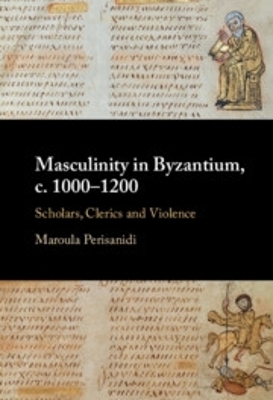
Masculinity in Byzantium, c. 1000–1200
Scholars, Clerics and Violence
Seiten
2024
Cambridge University Press (Verlag)
978-1-009-49979-8 (ISBN)
Cambridge University Press (Verlag)
978-1-009-49979-8 (ISBN)
Exploring the role of learning, violence and religious status in the construction of Byzantine masculinities, this book is valuable for scholars and students of gender, posthumanism and disability in any period as well as of Byzantine and medieval history.
What does it mean to be a man? What makes one effeminate or manly? What renders a man 'Byzantine'? Drawing from theories of gender, posthumanism and disability, this book explores the role of learning, violence and animals in the construction of Byzantine masculinities. It foregrounds scholars and clerics, two groups who negotiated the hegemonic ideal of male violence in contrasting and unexpected ways. By flaunting their learning, scholars accumulated enough masculine capital to present more “feminine” emotional dispositions and to reject hunting and fighting without compromising their masculinity. Clerics often appear less peaceable. Some were deposed for fighting, while many others seem to have abandoned their roles to pursue warfare, demonstrating the fluidity of religious and gender identity. For both clerics and scholars, much of this gender-work depended on animals, whose entanglements with humans ranged from domination to mutual transformation.
What does it mean to be a man? What makes one effeminate or manly? What renders a man 'Byzantine'? Drawing from theories of gender, posthumanism and disability, this book explores the role of learning, violence and animals in the construction of Byzantine masculinities. It foregrounds scholars and clerics, two groups who negotiated the hegemonic ideal of male violence in contrasting and unexpected ways. By flaunting their learning, scholars accumulated enough masculine capital to present more “feminine” emotional dispositions and to reject hunting and fighting without compromising their masculinity. Clerics often appear less peaceable. Some were deposed for fighting, while many others seem to have abandoned their roles to pursue warfare, demonstrating the fluidity of religious and gender identity. For both clerics and scholars, much of this gender-work depended on animals, whose entanglements with humans ranged from domination to mutual transformation.
MAROULA PERISANIDI is a Wellcome Trust Research Fellow at the University of Leeds, researching disability in Byzantium. She has previously held a Leverhulme Research Fellowship, which allowed her to publish widely on canon law, sexuality and gender, including her first monograph on Clerical Continence in Twelfth-Century England and Byzantium (2018).
1. Michael Psellos: writing like a man, 'throwing like a girl'; 2. Ioannes Tzetzes: a scholar and his animals; 3. Gregorios Antiochos: disabled bodies and desired becomings; 4. Hunting Churchmen; 5. Fighting the good fight.
| Erscheinungsdatum | 05.11.2024 |
|---|---|
| Zusatzinfo | Worked examples or Exercises; 3 Halftones, color |
| Verlagsort | Cambridge |
| Sprache | englisch |
| Maße | 152 x 229 mm |
| Gewicht | 450 g |
| Themenwelt | Geschichte ► Allgemeine Geschichte ► Mittelalter |
| Geisteswissenschaften ► Geschichte ► Regional- / Ländergeschichte | |
| Sozialwissenschaften ► Soziologie ► Gender Studies | |
| ISBN-10 | 1-009-49979-3 / 1009499793 |
| ISBN-13 | 978-1-009-49979-8 / 9781009499798 |
| Zustand | Neuware |
| Haben Sie eine Frage zum Produkt? |
Mehr entdecken
aus dem Bereich
aus dem Bereich
eine neue Geschichte des Mittelalters
Buch | Hardcover (2023)
C.H.Beck (Verlag)
CHF 53,20


